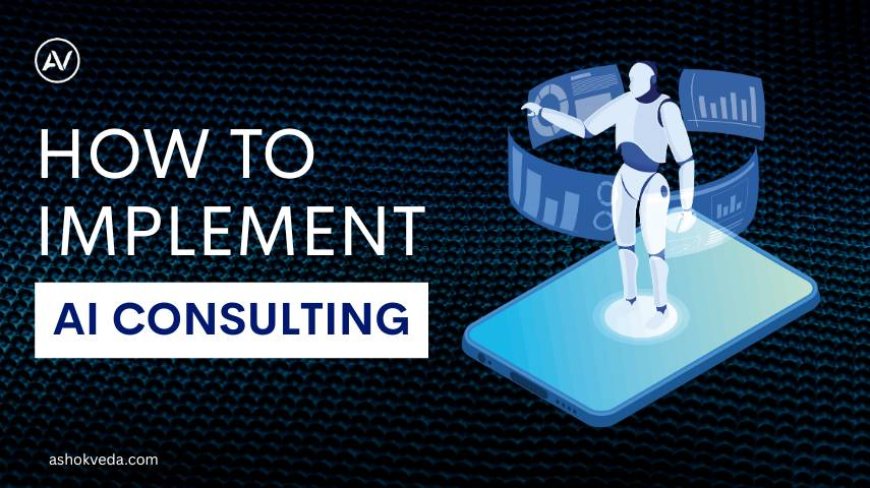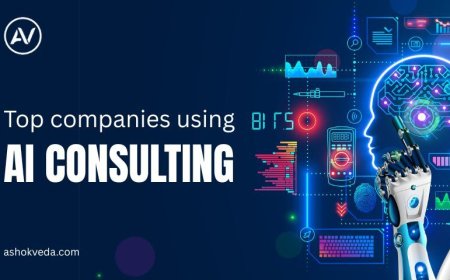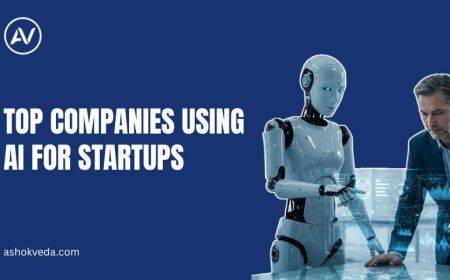How to Implement AI Consulting: A Comprehensive Guide
Learn how to implement AI consulting effectively in 2025 to drive business transformation, streamline operations, and gain a competitive edge.

Artificial Intelligence (AI) has transitioned from a futuristic concept to an operational necessity for modern businesses. By 2025, the global AI consulting market is projected to surpass $11.07 billion, growing at an impressive CAGR of 26.2%, according to Grand View Research. Nearly 60% of enterprise-level organizations already use AI in their workflows, and the majority rely on external consultants for strategy, execution, and support.
AI consulting is the strategic practice of advising businesses on how to effectively adopt AI technologies to enhance operations, products, and services. From data collection and model selection to deployment and ethical governance, AI consultants help organizations translate their vision into value. However, implementing AI consulting is not just about hiring experts; it requires a structured roadmap, organizational alignment, and measurable objectives.
Step-by-Step: How to Implement AI Consulting
1. Understand the Need for AI Consulting
Before implementation, organizations must identify why they need AI consulting. Common reasons include:
-
Lack of in-house AI expertise
-
Need for faster innovation
-
Pressure to enhance customer experience
-
Operational inefficiencies
-
Desire for data-driven decision-making
Companies must articulate their pain points and goals clearly. Is the focus on automation, customer personalization, or predictive analytics? Clear objectives streamline the consulting process and ensure alignment from the beginning.
2. Define AI Objectives and Use Cases
Once the need is established, the next step is to define AI objectives and what success looks like. This involves setting SMART goals (Specific, Measurable, Achievable, Relevant, Time-bound) and identifying potential AI use cases, such as:
-
Predictive maintenance in manufacturing
-
Chatbots for customer service
-
Fraud detection in banking
-
Personalized recommendations in e-commerce
-
Sentiment analysis in marketing
AI consultants will help assess the feasibility of these use cases based on data availability, ROI, and implementation complexity.
3. Assess Organizational Readiness
Implementing AI is not just a tech upgrade; it's a cultural shift. Key aspects to evaluate include:
-
Data Infrastructure: Is the data structured, clean, and accessible?
-
Technology Stack: Do you have the tools and platforms to support AI models?
-
Talent Pool: Are team members equipped to work alongside AI?
-
Leadership Buy-In: Is the C-suite aligned with the AI vision?
AI consultants may conduct workshops, audits, or maturity assessments to gauge readiness and bridge any gaps.
4. Choose the Right AI Consultant or Partner
Not all consultants are created equal. When selecting an AI consulting partner, consider:
-
Industry Expertise: Familiarity with your sector's challenges and trends
-
Technical Capabilities: Proficiency in AI/ML, data engineering, and cloud services
-
Past Projects: Case studies and client testimonials
-
Cultural Fit: Ability to integrate with your internal team and workflows
Many businesses issue RFPs (Request for Proposals) to compare consulting firms objectively.
5. Conduct Data Audit and Preparation
Data is the fuel for AI. An early-stage activity involves:
-
Data Collection: Gathering relevant internal and external data sources
-
Data Cleaning: Removing inconsistencies, duplicates, and errors
-
Data Labeling: Especially crucial for supervised learning models
-
Data Governance: Ensuring privacy, security, and compliance
Consultants will work with your data science and IT teams to prepare datasets that feed into AI models.
6. Build a Pilot or MVP (Minimum Viable Product)
Rather than going all-in, a pilot project helps validate assumptions and showcase value quickly. Steps include:
-
Selecting a low-risk, high-impact use case
-
Building a basic AI model or prototype
-
Testing on a small scale with real-world data
-
Collecting feedback and performance metrics
This phase provides early insights and helps gain stakeholder confidence.
7. Evaluate and Iterate
AI development is iterative. Once the pilot is tested, it’s critical to:
-
Measure KPIs (e.g., accuracy, efficiency gains, customer satisfaction)
-
Identify bottlenecks or errors
-
Refine algorithms and retrain models
-
Plan for scalability
Consultants play a key role in troubleshooting, optimizing, and guiding the next steps.
8. Scale Up and Integrate with Business Processes
After validation, it's time to scale. This involves:
-
Integration: Embedding AI tools into existing workflows and software
-
Automation: Linking with APIs, CRMs, and ERPs for seamless operations
-
User Training: Educating staff on how to interact with AI tools
-
Documentation: Creating playbooks and user guides
Consultants ensure the transition from MVP to enterprise-scale solutions is smooth and sustainable.
9. Monitor, Maintain, and Optimize
AI is not a "set it and forget it" solution. Continuous monitoring is essential to ensure relevance and performance. Ongoing tasks include:
-
Regular performance audits
-
Updating training data
-
Addressing concept drift
-
Recalibrating models as needed
Consultants may offer managed services or hand over responsibility to in-house teams.
10. Ensure Ethical and Responsible AI
With great power comes great responsibility. Ethical AI implementation should be a top priority. This means:
-
Avoiding bias in datasets and models
-
Ensuring transparency and explainability
-
Adhering to regulations (GDPR, HIPAA, etc.)
-
Engaging stakeholders in governance frameworks
AI consultants help establish ethical guidelines and embed fairness into model design.
Benefits of Proper AI Consulting Implementation
-
Improved Decision-Making: Leverage insights from big data to guide strategic choices.
-
Increased Efficiency: Automate repetitive tasks and reduce human error.
-
Enhanced Customer Experience: Deliver personalized and real-time interactions.
-
Competitive Advantage: Innovate faster than peers.
-
Cost Savings: Optimize operations and resource allocation.
Common Pitfalls to Avoid
-
Lack of Clear Objectives: Vagueness leads to misaligned outcomes
-
Poor Data Quality: Garbage in, garbage out
-
Underestimating Change Management: People need support, not just tools
-
Overreliance on Technology: AI is a tool, not a magic wand
-
Skipping Post-Implementation Monitoring: AI models need regular updates
Essential Skills for AI Consultants
-
Technical: Python, R, machine learning, cloud platforms, data engineering, MLOps, and generative AI.
-
Business: Industry expertise, use-case identification, business case development, project management.
-
Soft Skills: Communication, collaboration, and storytelling—explaining complex AI systems in plain English is invaluable.
-
Regulatory & Ethical: Knowledge of compliance, data governance, and responsible AI frameworks
Implementing AI consulting is a strategic journey that requires vision, collaboration, and continuous improvement. In 2025 and beyond, organizations that get this right will lead in innovation, agility, and customer satisfaction. The key lies not just in adopting AI, but in implementing it intelligently—with expert consultants guiding each step of the way.
From assessing readiness and defining use cases to scaling solutions and ensuring ethics, a well-structured AI consulting roadmap transforms technology into tangible business outcomes. As industries become more data-driven, the question isn’t if you should implement AI consulting—it’s how well you do it. If you're ready to begin your AI journey, choose the right partners, start small, learn fast, and scale smart. The future belongs to those who act today.





































